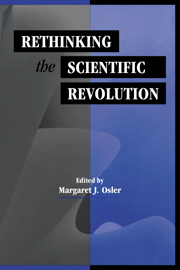Book contents
- Frontmatter
- Contents
- List of Contributors
- Preface
- Introduction
- Part I The Canon in Question
- Part II Canonical Disciplines Re-Formed
- 4 The Role of Religion in the Lutheran Response to Copernicus
- 5 Catholic Natural Philosophy: Alchemy and the Revivification of Sir Kenelm Digby
- 6 Vital Spirits: Redemption, Artisanship, and the New Philosophy in Early Modern Europe
- 7 “The Terriblest Eclipse That Hath Been Seen in Our Days”: Black Monday and the Debate on Astrology during the Interregnum
- 8 Arguing about Nothing: Henry More and Robert Boyle on the Theological Implications of the Void
- Part III Canonical Figures Reconsidered
- Part IV The Canon Constructed
- Index
4 - The Role of Religion in the Lutheran Response to Copernicus
Published online by Cambridge University Press: 25 October 2009
- Frontmatter
- Contents
- List of Contributors
- Preface
- Introduction
- Part I The Canon in Question
- Part II Canonical Disciplines Re-Formed
- 4 The Role of Religion in the Lutheran Response to Copernicus
- 5 Catholic Natural Philosophy: Alchemy and the Revivification of Sir Kenelm Digby
- 6 Vital Spirits: Redemption, Artisanship, and the New Philosophy in Early Modern Europe
- 7 “The Terriblest Eclipse That Hath Been Seen in Our Days”: Black Monday and the Debate on Astrology during the Interregnum
- 8 Arguing about Nothing: Henry More and Robert Boyle on the Theological Implications of the Void
- Part III Canonical Figures Reconsidered
- Part IV The Canon Constructed
- Index
Summary
Betty Jo Teeter Dobbs not only shifted the boundaries of Newton scholarship, she changed its center. Her first book The Foundations of Newton's Alchemy shifted the boundaries of inquiry by insisting on the importance of disciplines outside the canonical sciences in understanding the scientific tradition. In The Janus Faces of Genius she took the further step of arguing that religion, not science, was the real center of Newton's thought. Although Dobbs's main work focused on Newton, it would be a great loss to historical scholarship if we failed to draw the wider historiographical consequences of her work – consequences she herself made plain in her 1993 History of Science Society Lecture “Newton as Final Cause and First Mover.” In the present chapter I support Dobbs's contention that these historiographical shifts and recenterings are important in understanding the history of science well before Newton and his time. The period I consider begins with the Reformation and concludes with the career of Johann Kepler. My main concern involves Lutheran natural philosophers and astronomers, and especially those trained at Wittenberg after its reform by Philip Melanchthon. After briefly reviewing earlier opinions on the relation between science and religion in this period, I go on to document the role of Lutherans in spreading Copernicus's ideas, and the pervasive positive effect of their religion on Lutheran scientific thought. I suggest that Kepler's early work, in particular, should be read as centrally religious.
- Type
- Chapter
- Information
- Rethinking the Scientific Revolution , pp. 59 - 88Publisher: Cambridge University PressPrint publication year: 2000
- 12
- Cited by



